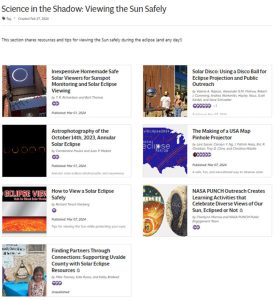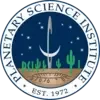March 19, 2024, Tucson, Ariz. – A new resource is available to help individuals and groups safely prepare for the upcoming April 8, 2024 solar eclipse.
A collection of articles put together by Planetary Science Institute Senior Education and Communication Specialist and Senior Scientist Sanlyn Buxner document events, experiences and engagements associated with the upcoming 2024 eclipse and the earlier October 2023 annular eclipse.
“These are free articles for anyone to read to help prepare for the upcoming eclipse,” Buxner said. “The articles cover a wide variety of topics, including safe eclipse viewing, challenges faced and success of towns along the path, creative ways to safely engage the public in viewing the Sun, and narratives about how members of the public have contributed to science in the past and can do so again in the future.”
The new collection of 33 articles, “Celebrating the Wonder of Science in the Shadow,” is found in the Bulletin of the American Astronomical Society (BAAS). Sections offered are Personal Narratives, Viewing the Sun Safely, Eclipse Science and Investigations, Peer Reviewed Papers, Eclipse Education and Outreach Tools and Resources, Human Perspectives Under the Shadow, and Reports from the Field.
“This is the first issue of a set of special issues to help individuals and groups celebrate and share their eclipse experiences to help prepare for the upcoming eclipse,” Buxner said. “We knew that the community wanted an outlet to share their experiences and resources and wanted an outlet that had credibility and reach to share. We also knew we needed to get something out that let people share their October 2023 experience in time for the 2024 eclipse.”
Buxner led the project, with support from the BAAS, by presenting the idea to the community, recruiting authors and editors through collaboration with many partners, sent each article to an editor and peer reviewer, which applicable, and arranged the final layout of the issue.
PSI Senior Scientist Pamela Gay was a co-editor who helped edit papers for science and readability.
“For any particular place on the Earth, eclipses are rare. There is still a lot of research waiting to be done by people lucky enough to be within the shadow of an eclipse,” Gay said. “From studying how life on Earth is affected by eclipses to testing Einstein’s general theory of relativity, there are still ways people in the right place with the right equipment can help us understand our universe better.”
Buxner said she wanted to ensure the articles collected were as representative of the community of astronomy enthusiasts as possible. This meant not just seeking the perspectives of professional scientists and educators, but also diving into the nuts and bolts of what preparing for an eclipse was like for city planners, national parks, and even a DIY scientist observing from home.
“We were – and are – interested in everyone telling their own eclipse story, glamorous or not. We want individuals to be able to document their experience, images, and scientific findings, as well as share their excitement and help the larger community prepare for the next big event with their great ideas and lessons learned.”
The project was a completely volunteer effort, and the collection is available entirely for free through the American Astronomical Society. Submissions for the second issue are now open to celebrate the April 8th eclipse!
MEDIA CONTACT:
Alan Fischer
Public Information Officer
520-382-0411
[email protected]
SCIENCE CONTACT:
Sanlyn Buxner
Senior Education and Communication Specialist and Senior Scientist
[email protected]
PSI INFORMATION
Mark V. Sykes
Director
520-622-6300
[email protected]
PSI HOMEPAGE
https://www.psi.edu
PSI PRESS RELEASES
https://www.psi.edu/press-releases/
THE PLANETARY SCIENCE INSTITUTE:
The Planetary Science Institute is a private, nonprofit 501(c)(3) corporation dedicated to Solar System exploration. It is headquartered in Tucson, Arizona, where it was founded in 1972.
PSI scientists are involved in numerous NASA and international missions, the study of Mars and other planets, the Moon, asteroids, comets, interplanetary dust, impact physics, the origin of the Solar System, extra-solar planet formation, dynamics, the rise of life, and other areas of research. They conduct fieldwork on all continents around the world. They also are actively involved in science education and public outreach through school programs, children’s books, popular science books and art.
PSI scientists are based in 35 states and the District of Columbia.

The Celebrating the Wonder of Science in the Shadow collection includes a section on how to safely view an eclipse.

